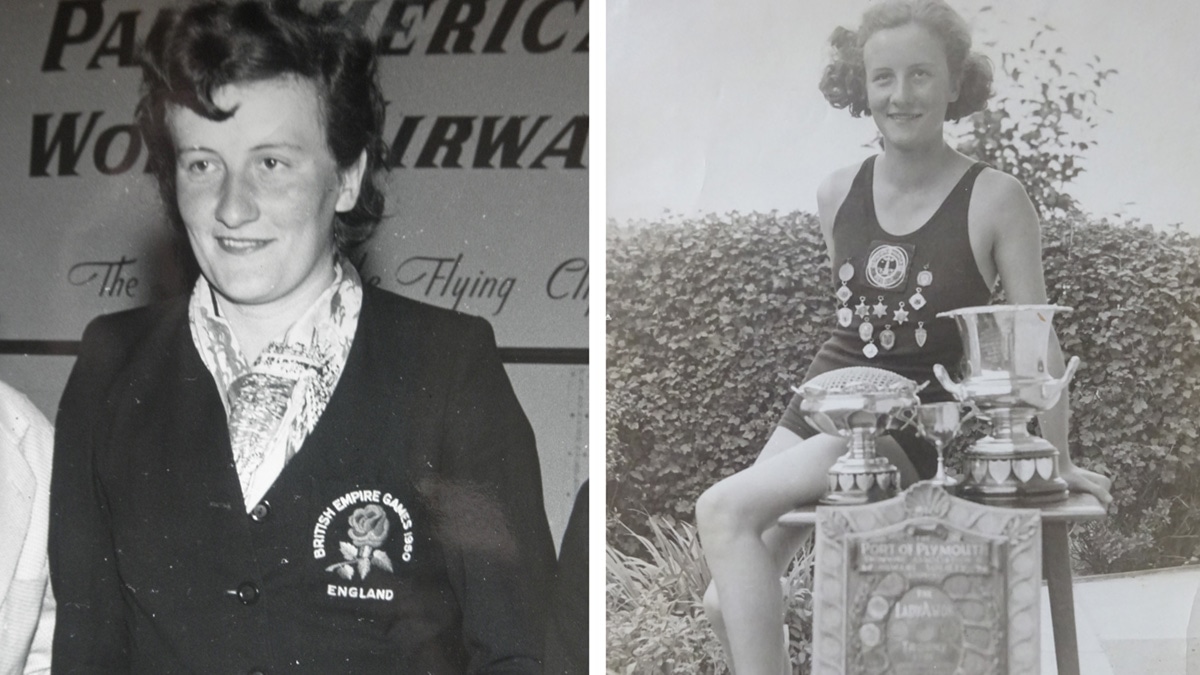
Remembering Helen Yate ... the best all-round swimmer in the country of her day
27 December 2020Viewers of the BBC Sports Personality of the Year would have noticed swimmer Helen Yate included in the tribute to those who had sadly died in 2020.
Here, swimming historian Ian Gordon looks back on the life of Helen, who got to finally realise her Olympic dream at the 1948 London Games.
It’s fair to say that Helen Yate was the best all-round swimmer in the country of her day.
Helen, from Plymouth, where she swam for the Port of Plymouth club, won the A.S.A. Ladies backstroke Championship in 1938 before the outbreak of War at the age of 17.
She had been the Western Counties title holder since 1936 for 150/100y backstroke and represented Britain at the 1938 European Championships in London, where she finished sixth in the final.
She also was a useful freestyler winning the National 220y championship in 1939.
Her father, a keen swimmer and a railway guard with the Great Western Railway, taught her to swim in the sea.
Helen was the last of her sisters and the slowest to learn and a Mr Linnus helped with her early coaching in the old open-air pool off the Hoe.
She was initially beaten by her non-identical twin sister, who also reached county standard but hadn’t the same competitive spirit.
By the age of 12 Lt. Commander Ward took over her training and, during the winter months, she used the old naval baths at H.M.S. Drake and developed her freestyle skills.
Back to winning ways
Despite this, her times lacked behind national level performances and seeing the name of the famous coach and journalist Bill Howcroft in the paper, Helen went for a trial in London at the Mermaid S.C.
After her trial he told her father she would be a national champion either that year or the year after and he was proved right with Helen taking the national title in the 150yard Backstroke at the Great Yarmouth nationals of 1938.
Selected for her first major competition that year – the European championships at Wembley – she made the final, finishing sixth in the 100m Backstroke and took the national 220y Freestyle title in 1939.
By this time she was living in London and training with the Mermaids under Bill Howcroft at Finchley Road, Chelsea, and Nine Elms Baths throughout the capital and working for the Great Western Railway.
During the Second World War, Helen served with the W.R.N.S. and missed what would have certainly been two further Olympic appearances when the Games of 1940 and 1944 were both cancelled.
In 1945, she was back to her winning way taking the Western Counties title at both 100y Freestyle and 150y Backstroke and regained her A.S.A. backstroke title in 1949 (when the event had changed to 100y).
She had placed second in 1946 to Monique Berlioz, of France, later to become a director of the IOC, and in 1948 to Ngairi Lane, of New Zealand, and two years later made the Olympic team by virtue of a second place at the National Championship.
In her own words, 1947 ‘wasn’t her best year’ and she had a disappointing National Championships, at Hastings, and didn’t make the team for the Monaco European Championships – but she was back on form for 1948 and the London Olympic Games.
At the London Olympics, her fourth place in the semi-final of the 100m Backstroke in 1.18.6 was the best of the three British entrants but not enough to make the final.
Honour of representing your country
At the Commonwealth Games of 1950, in New Zealand, she returned with three medals – individual bronze in the 110y Backstroke, plus silver in England’s medley relay and another bronze with the freestyle relay team – despite a six week boat journey to get there.
A year later, she returned with Maggie Wellington for the New Zealand Centenary Celebrations – this time flying around the world to get there.
Her British record for 100y Backstroke was established on 6 May 1951, when she was 30 years old and it was 45 years until another thirty-year-old British female swimmer – Caroline Foot – broke a British record. Helen’s first record had come some thirteen years before in 1938.
Helen’s last international appearance in her long career was the same year when she swam against France in Brest.
She later swam for Mermaid SC, in London, and was a member of their team that won the National Freestyle and Medley Team Championships in 1952.
Several times she acted as chaperone to English and British teams, including the 1960 and 1964 Olympic Games, and also on the first trip by a British team to China in 1957.
Helen, who never married, worked for British Rail until 1981 and lived with her twin sister in retirement in Hooe, Plymouth.
In 2012, she accompanied her friend Elizabeth Church, another of the 17 surviving members of the 1948 team, to watch the London Olympic Games.
In an interview at the time, she remembered the reward for her efforts saying: “Well, I got a bit of time off afterwards but we weren’t paid, of course. It was the honour of representing your country.”
Helen passed away only a few months short of her 100th birthday having lived an independent existence in her own house until only four days before her death.
 Swim England
Swim England